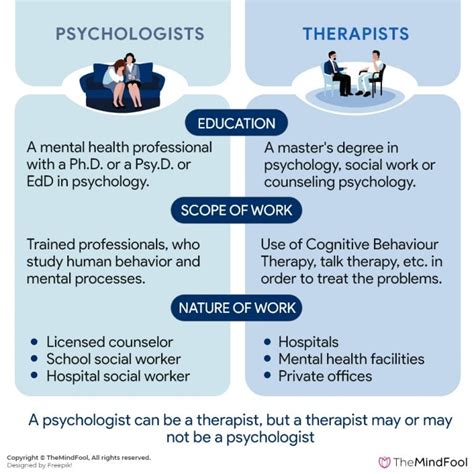Lcsw Vs. Psychologist: Differences & Comparisons

When seeking mental health support, you may come across the terms LCSW and psychologist. While both professionals offer therapy and counseling services, there are some key differences between the two. Understanding these differences can help you make an informed decision about the type of provider that best suits your needs. In this article, we will explore the differences and comparisons between LCSWs and psychologists.
1. Education and Training
LCSW: Licensed Clinical Social Workers (LCSWs) have a master’s degree in social work (MSW) and have completed a minimum of two years of supervised clinical experience. They are licensed by their state’s social work board.
Psychologist: Psychologists have a doctoral degree in psychology (Ph.D. or Psy.D.) and have completed several years of supervised clinical training. They are licensed by their state’s psychology board.
2. Scope of Practice
LCSW: LCSWs provide therapy and counseling services to individuals, families, and groups. They often focus on helping clients address social and environmental factors impacting their mental health.
Psychologist: Psychologists also provide therapy and counseling services, but they may have a broader scope of practice. They can conduct psychological assessments, diagnose mental health disorders, and provide specialized treatments.
3. Approach to Therapy
LCSW: LCSWs often take a holistic approach to therapy, considering a person’s social, cultural, and environmental factors. They may utilize various therapeutic modalities, such as cognitive-behavioral therapy (CBT) or psychodynamic therapy.
Psychologist: Psychologists may use evidence-based approaches to therapy, such as cognitive-behavioral therapy (CBT), dialectical behavior therapy (DBT), or acceptance and commitment therapy (ACT). They may also specialize in specific treatment modalities.
4. Insurance Coverage
LCSW: Many insurance plans cover therapy services provided by LCSWs. However, coverage may vary depending on your specific plan and provider.
Psychologist: Like LCSWs, psychologists are often covered by insurance plans. However, it’s essential to check with your insurance provider to understand the specific coverage and any potential limitations.
5. Cost of Services
LCSW: The cost of therapy sessions with an LCSW may vary depending on factors such as location and experience. They may offer sliding-scale fees based on income.
Psychologist: The cost of therapy sessions with a psychologist can also vary based on location and experience. Some psychologists may offer sliding-scale fees, while others may have fixed rates.
6. Collaboration with Other Professionals
LCSW: LCSWs often collaborate with other professionals, such as psychiatrists or medical doctors, to provide comprehensive care. They may work as part of a multidisciplinary team.
Psychologist: Psychologists may also collaborate with other professionals, but they may have a more independent practice. They can provide assessments and recommendations for psychiatric medication but cannot prescribe medication themselves.
7. Focus of Treatment
LCSW: LCSWs often focus on helping clients navigate social and environmental challenges that impact their mental health. They may address issues such as poverty, discrimination, or family dynamics.
Psychologist: Psychologists can help clients with a wide range of mental health concerns, including diagnosing and treating specific mental health disorders. They often focus on the individual’s thoughts, emotions, and behaviors.
8. Professional Organizations
LCSW: LCSWs may be members of professional organizations such as the National Association of Social Workers (NASW) or the Council on Social Work Education (CSWE).
Psychologist: Psychologists may be members of organizations such as the American Psychological Association (APA) or the Association for Psychological Science (APS).
9. Continuing Education Requirements
LCSW: LCSWs are typically required to complete a certain number of continuing education hours per renewal period to maintain their licensure.
Psychologist: Psychologists also have continuing education requirements to maintain their licensure. They may need to complete specific courses or attend conferences and workshops.
10. Referral Process
LCSW: If an LCSW believes a client would benefit from additional services, such as psychiatric evaluation or specialized therapy, they can provide referrals to appropriate professionals.
Psychologist: Psychologists can also provide referrals to other professionals when necessary. They may refer clients to psychiatrists, primary care physicians, or other specialists.
Conclusion
While both LCSWs and psychologists offer therapy and counseling services, there are some notable differences between the two. LCSWs have a master’s degree in social work and focus on social and environmental factors impacting mental health. Psychologists have a doctoral degree in psychology and may have a broader scope of practice, including psychological assessments and specialized treatments. It’s important to consider your specific needs and preferences when choosing a mental health provider.
Frequently Asked Questions
Q: Can LCSWs diagnose mental health disorders?
A: While LCSWs cannot formally diagnose mental health disorders, they can assess and provide treatment for various mental health concerns.
Q: Can psychologists prescribe medication?
A: Psychologists cannot prescribe medication. However, they can provide assessments and make recommendations for psychiatric medication in collaboration with a psychiatrist or medical doctor.
Q: How long does it take to become an LCSW?
A: The process of becoming an LCSW typically involves earning a master’s degree in social work, completing supervised clinical experience, and obtaining licensure. The duration can vary, but it generally takes several years.
Q: Are LCSWs and psychologists confidential?
A: Both LCSWs and psychologists are bound by confidentiality laws and ethical guidelines. They are required to keep client information confidential, with some exceptions for safety concerns.
Q: How do I choose between an LCSW and a psychologist?
A: When choosing between an LCSW and a psychologist, consider your specific needs, preferences, and the scope of practice you require. It may be helpful to schedule consultations or introductory sessions with potential providers to determine which one feels like the best fit for you.
